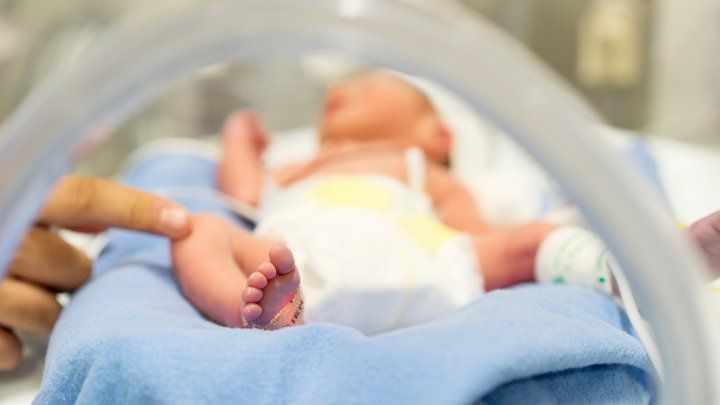
Expanding routine newborn screening to include a metabolic vulnerability profile could lead to earlier detection of life-threatening complications in babies born preterm, according to a study by UC San Francisco researchers. The new method, which was developed at UCSF, offers valuable and time-sensitive insights into which infants are at greatest risk during their most vulnerable time, immediately after birth.
The study, published in Nature Pediatric Research by scientists at the UCSF California Preterm Birth Initiative (PTBI-CA), assessed the records of 9,639 preterm infants who experienced mortality or at least one complication.
Using the results of standard newborn profiles and blood tests, they identified a combination of six newborn characteristics and 19 metabolites that, together, created a vulnerability profile that reliably identified preterm babies at substantially increased risk for death and severe illness. Illnesses may include serious breathing and digestive conditions known as respiratory distress syndrome and necrotizing enterocolitis.
"Our results point to a number of potential biological pathways that may play a key role in the development of negative outcomes in babies born preterm," said the study's lead author Scott Oltman, MS, epidemiologist, UCSF PTBI-CA. "If we can better understand these pathways, new treatments or preventative measures may be possible."
Metabolites are molecules such as glucose or thyroid stimulating hormone (TSH) that are naturally produced by our cells as we break down food or medications. In a newborn, these molecules may originate from the mother's bloodstream or be generated by the infant, and can be used to assess whether the body is functioning normally.
Of particular note are the investigative team's findings that Black babies were 35 percent more likely than white babies to die or experience serious illness.
"We are particularly excited about the potential for these metabolic models to help us address critical inequities in outcomes in Black infants," said senior author Laura Jelliffe-Pawlowski, PhD, MS, professor of Epidemiology and Biostatistics in the UCSF School of Medicine, and director of Discovery and Precision Health with PTBI-CA. "Going forward, we should be able to create personalized care plans for each baby born too early, which will help us reduce race/ethnic disparities in outcomes."
Advances in science have enabled even the most fragile preterm babies to survive in greater numbers and at younger gestational ages. In the United States, approximately 1 in 10 live infants is delivered preterm. However, preterm birth and related comorbidities are the leading cause of death for U.S. children under five years of age, with neonatal (newborn) deaths accounting for 46 percent of mortality in this age group.
Previous models attempting to predict complications after preterm birth have relied only upon the infant's gestational age, birthweight and other clinical characteristics. This study expanded the characteristics to include maternal factors, such as race, maternal age and education. It also identified 19 molecules such as TSH and glycine that also contributed to prediction. These metabolites are routinely tested in newborn screens, but are not assessed as a composite. These metabolites play important roles in many biological pathways including in digestion, respiration and temperature regulation.
"Some of the pathways we have identified may offer inroads for intervention and could eventually lead to fewer deaths and lessened short- and long-term disability in babies born too early," Jelliffe-Pawlowski said.
This study is paving the way for continued research on how these models could help preterm newborn babies. The next phase of this study is funded by the National Institutes of Health and begins this fall through 2025. It will enroll 500 very preterm babies in California and Iowa to test how well the newly identified metabolic models work in neonatal intensive care unit (NICU) settings. As part of this work, PTBI-CA researchers will collaborate with the Benioff Center for Microbiome Medicine to look at the microbiomes of babies in the new study to identify additional drivers of short- and long-term of outcomes.
Authors: The study was led by Scott P. Oltman. Elizabeth E. Rogers, James G. Anderson, Martina A. Steurer, Matthew S. Pantell, Mark A. Petersen, J. Colin Partridge, Deborah Karasek, Sky K. Feuer, Linda S. Franck, Larry Rand and Laura L. Jelliffe-Pawlowski of UCSF; Rebecca J. Baer of UC San Diego; Elizabeth A. Jasper, John M. Dagle and Kelli K. Ryckman of University of Iowa and Kharah M. Ross of University of Calgary are co-authors.
Funding: This work was supported by the UCSF California Preterm Birth Initiative.
Disclosure Statement: The authors have no financial ties to products in the study or potential/perceived conflicts of interest.
About the UCSF California Preterm Birth Initiative: The UCSF California Preterm Birth Initiative (PTBI) is a research enterprise whose mission is to eliminate racial disparities in preterm birth and improve health outcomes for babies born too soon through research, partnerships and education grounded in community wisdom. PTBI conducts and funds transdisciplinary research to identify promising interventions that can turn the curve on the preterm birth epidemic and create positive change for Black and brown families. Funded by Lynne and Marc Benioff, PTBI asserts structural and interpersonal racism along with other key social determinants are important drivers of an epidemic that disproportionately affects women of color in our state, and nationally.
About UCSF: The University of California, San Francisco (UCSF) is exclusively focused on the health sciences and is dedicated to promoting health worldwide through advanced biomedical research, graduate-level education in the life sciences and health professions, and excellence in patient care. UCSF Health, which serves as UCSF's primary academic medical center, includes top-ranked specialty hospitals and other clinical programs, and has affiliations throughout the Bay Area.






